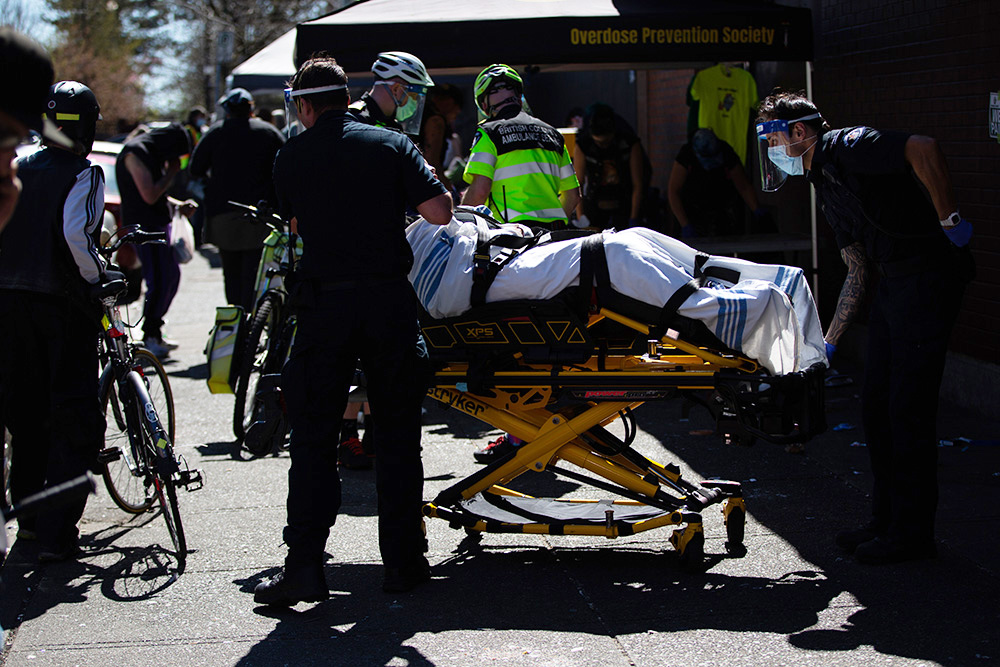NDP health critic Don Davies is calling on Canada to decriminalize the simple possession of illicit substances and expand federal support for safe supply and harm reduction efforts to save lives amid the country’s worsening drug poisoning crisis.
Davies introduced the Health-based Approach to Substance Use Act in Parliament today. It would decriminalize the possession of small amounts of drugs and expunge the criminal records of people convicted of simple possession. Drug trafficking and manufacturing would still be illegal.
“It’s time to treat substance use and addiction as the health issues they truly are,” said the Vancouver Kingsway MP. “It’s time to end Canada’s failed war on drugs.”
The bill was introduced just a day after British Columbia announced it would seek federal permission to decriminalize personal possession of drugs.
The private member’s bill is unlikely to reach debate or become law.
The act also calls on the minister of health to establish a federal safe supply strategy to make regulated pharmaceutical alternatives to street drugs more widely available, in order to reduce people’s dependence on the poisoned illicit drug supply.
More than 20,000 people have died of poisoned drug overdoses in Canada since January 2016. And 2020, B.C.’s most deadly year on record, also saw a near doubling in deaths between April and September nationwide compared to the year before.
But Prime Minister Justin Trudeau has repeatedly rejected decriminalization because it is not a “silver bullet” solution and has favoured a focus on safe supply efforts.
There is no simple solution, Davies agreed, but said it is time for bolder action to be considered at the federal level to curb drug poisoning deaths.
Leaving it up to individual regions to request exemptions from Ottawa to decriminalize is an unnecessary barrier, he said.
“We know that people are dying of overdoses in every jurisdiction in this country,” said Davies. “Instead of this being a good policy in Vancouver or Montreal, this should be the policy that is open to all.”
Support for decriminalization has grown as the COVID-19 pandemic has exacerbated the ongoing overdose crisis in B.C. and led to an increasingly toxic street supply of drugs.
Decriminalization would also help to remove some of the stigma and shame that drives many to use alone, thus reducing their risk of overdosing on poisoned drugs.
Its backers include B.C. provincial health officer Dr. Bonnie Henry and her predecessor Dr. Perry Kendall, their counterparts in the city of Toronto, B.C. Premier John Horgan and the Canadian Association of Chiefs of Police.
Decriminalization is “intrinsically linked” with safe supply, said Leslie McBain, co-founder of Moms Stop the Harm, who spoke alongside Davies today.
“People can’t stop accessing drugs just because it is illegal to possess them,” she said. “And a safer supply helps our loved ones stay alive and stabilized.”
Safe supply efforts have stalled in B.C. with no timeline, despite the government’s pre-election announcement seven months ago that it was expanding the programs.
Guy Felicella, a peer clinical advisor at the BC Centre on Substance Use, would like to see the federal government step up to manufacture and distribute pharmaceutical grade versions of substances like heroin and fentanyl domestically.
The current medical model makes doctors and health-care providers, often hesitant to take on the risk of prescribing powerful substances, the gatekeepers who decide whether people can get substances that could save their lives.
With greater domestic supply, compassion club models could help remove many people from the poisoned drug supply with “safer substances, just like they have access to regulated cigarettes.”
“The medical model will never meet demand,” said Felicella, who joined Davies in a media event. “If we can get there, we can save lives.” ![]()
Read more: Health, Rights + Justice, Politics
















Tyee Commenting Guidelines
Comments that violate guidelines risk being deleted, and violations may result in a temporary or permanent user ban. Maintain the spirit of good conversation to stay in the discussion.
*Please note The Tyee is not a forum for spreading misinformation about COVID-19, denying its existence or minimizing its risk to public health.
Do:
Do not: